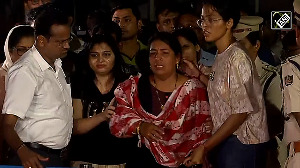
What can a CEO do to improve organisational performance when you cannot hire and fire? Not much, most would say. Yet Raghunath Anant Mashelkar, Director General, Council of Scientific and Industrial Research, has turned conventional wisdom on its head with the turnaround of India's apical scientific research institution.
We tried to find out what it is that he does right, what makes him a good CEO. "Help people be the best they can be," he advises, and drive performance through them. Here's how he does it.
Making a bad organisation good means developing new products and processes, having a business like attitude to topline and bottomline results, combining empowerment with reward for performance, customer friendliness, knowledge management, global outlook, and forging partnerships both with local organisations and foreign, be they big or small. But most importantly, making a bad organisation good means changing the mindset.
For any organisation, creating the right ambience is extremely important, as is creating ambition among people. One without the other doesn't work.
Without ambience, ambition cannot flower, and vice versa. At National Chemical Laboratory, I tried to create that ambition by making people stretch. I made them believe in themselves, made them realise their potential, because I always believe that our potential is always higher than where we actually are.
People will rise to the occasion: I believe there is no limit to human achievement and to human endurance. It is a question of whether the leader will allow people's energy to be released.
Let me give you an example. In 1995, I began talking about the road to Lakshmi through Saraswati i.e. bring a business like attitude to research. As I traveled across India from Kashmir to Kanyakumari, visiting each of the 40 labs to carry my message, some responded positively (particularly the chemistry laboratories who were tuned into business), but others (like the biology laboratories) did not.
One of the biology labs is the Center for Molecular Biology, a fabulous lab located in Hyderabad, specially built for research in basic science, which harbours dreams of winning Nobel prizes and producing Fellows of The Royal Society.
Amongst the best young scientists I met there was Dr Jay Gauri Shankar. He was sitting right in front of me, in the front row. Now the culture of this lab is such that it does not look up to the Director General as a demigod but as a scientist like themselves. After my speech, Dr Shankar stood up and angrily shot back, saying we would corrupt ourselves if we went down the road I was suggesting. It was a free and frank dialogue.
The same scientist, exactly two years later during another visit to CMB, came to inform me that he had developed a breakthrough for which we had received a US patent. He sensed it could make pots of money, and wanted to know how one determines the royalty to be charged, how can one convert the discovery into a business proposition. In fact, this did become a business proposition.
Real triumph was exactly one year after that, when we gave him the Technology award. He also received the Bhatnagar award, which is the highest prize that you can get in the field of science in India. The man who got both the Bhatnagar and Technology award was the same man who three years earlier just did not believe in my philosophy!
We cannot afford to be poor and human capital is the basis on which India can become rich. For that to happen, people must change. To change people, you have to touch their hearts, you have to touch their brains, and convert knowledge into wealth. This is our responsibility.
In Dr Shankar's case, he discovered that he could be a 'corporate scientist' without sacrificing the cause of pure science. That is number one. Number two, he saw the wave sweeping through CSIR where some great scientists were following a different path and getting glory without any sacrifice whatsoever. The surrounding was changing and after all, he was part of the society that was changing.
For change to happen, we spoke about the need to change mindsets. Policies too need to be changed. Earlier, there was a supply side approach: people would make research plans where you generate knowledge and then look for a buyer. I changed that. I said you must have business plans and you cannot have business plans unless you know the market. So we exposed people to the outside world. We made it mandatory. At the same time, we left a lot of flexibility in terms of the space within which people will move and the timeframes.
There were laboratories, such as NCL, which were already up there. These had different targets. "Your potential for global exports is high," I told them, "I would like to see some dollar earnings. I would like to see quality in your earnings. Earning should not come from testing, training and the mundane but from the sale of high level innovations." So there were stiffer targets for them, but there were labs like CMB where this philosophy was a cultural change. Here we gave a longer response time.
We touch where it can hurt: it's the last resort to draw out performance. Unfortunately, in the CSIR system there are no visible penalties. You can make some people move a little slower in their career tracks, or make some move a little faster but you cannot stop anybody because this is a public institution. The budget is the only instrument I can use.
So we linked budgets to performance. It hurts when you cannot get budgetary support for your ideas, if those ideas do not fall within the new mandate that we are developing.
Second, in the science community, there is a lot of peer pressure. People are always comparing themselves to each other: he got the Bhatnagar Prize, he got published in such-and-such journal, he was recognised in the laboratory. If you get left behind, it makes a difference. It is a subtle kind of penalty but real, I would say.
CSIR survives because of the innovation and creativity of its people. Innovation is not only about doing different things but about doing things differently. And when people do things differently, they need to be recognised, rewarded and the entire process supported.
I believe in TI, total innovation. What we have tried to do within CSIR is to set systems at different levels which reward innovators. For example, each lab has a New Idea Fund where people with even outlandish ideas can come. It is a major cultural change: risk taking used to be shunned, now it is looked at positively.
We are also trying to introduce cross disciplinary culture. An innovator is one who doesn't know that it cannot be done, and a person from another discipline is also one who doesn't know that it cannot be done.
That is the purpose of bringing chemists, physicists, engineers, psychologists and even social scientists together from around the world. We encourage cross disciplinary work, and special funds are allocated for this. Some major breakthroughs are already taking place: a physical chemist, Dr Shastri, using biological processes has been able to create gold.
Funding and budgets is one way to reward and punish. In public institutions, we have a difficult time in dealing with the issue of people who do not perform.
There was one person at my headquarters. I tried my best to make him come up to a particular level but it simply was not working. I shifted him regardless of his political connections, because at the end of the day CSIR is a Rs 12,000 crore (Rs 120 billion) organisation.
Managing conflict is part of my job. When the Bhopal disaster took place, I was the technical assessor. When 34 people died in the explosion at IPCL's Nagothane gas cracker complex, I was chairman of the inquiry committee. I chaired the National Auto Fuel Policy, the Teri Dam committee. Today I chair the Spurious Drug Committee. In every committee, ideologies conflict. I find that people who sit on such committees honestly believe in their ideologies.
What that means is that there is as much work to be done outside as inside the committee meeting. You have to deal with them one-to-one, make them see that part of the issue that they were not able to see. I have always found that somehow or the other people do come around. At the same time, I have never had to compromise though sometimes others have convinced me by their logic.
In managing conflict, a discussion or a debate, people should never be driven into a corner. I tell them, "Maybe you have a point, maybe we can sleep over it, maybe we can talk about it tomorrow, let's do some homework on it." This approach does miracles. People do go back and think. People do not, particularly in public, like to be humiliated and I have never done that in my life, even if I do not believe what the individual is saying.
That intervening period can be used to bring out some fact or put into play some emotion. Maybe someone he trusts speaks to him. There are dozens of different ways to make people come around and probably that is why there are more Mashelkar Committees than you can imagine.
Sometimes I have faced great coercion, but I never lost sight of a national objective or a national goal. We are temporary actors on the stage: India is what matters at the end of the day. Give people the big picture and they will listen.
This requires perseverance and a lot of patience. The National Auto Fuel Policy was a huge challenge for me because the CNG lobby was driving it so hard. I was under such severe stress. I was mauled on the front page of the Times of India for six days in a row.
On the seventh -- a Sunday -- they had mercy, they put me in the inside cover, naming me as the most harassed man of the week. But I did what I did because I believed what I was doing was right.
There has to be a multi fuel, multi technology policy. There has to be customer choice and that's it. It cannot be driven by other agendas. It took twelve months of hard work and stress but in the end the country got a balanced auto fuel policy where national interests are protected.
I am often asked whether leaders are born or bred and I have no scientific answer. I don't think there is something like a born leader, it is an evolutionary process, it has been so for myself.
In public institutions and particularly in my case, we do not go through formal training such as leadership programs or business school. It's more of learning on the job.
The difference between a manager and a leader is that a leader creates leaders, not followers. He makes people accept his idea as their own. A leader needs to be a good teacher. Managers do not manage machines, they manage people. Good managers are those who understand the importance of human capital, human psychology, the human mind as well as the human heart.
That is why I always say you must have three qualities: innovation in the brain, compassion in the heart and passion in the belly. If you miss even one, I don't think you are either a good manager or a good leader.
It's rare for a good manager to evolve into a good leader. Leadership is more complicated. But it is not only something you evolve into, but also something that others give you. A leader establishes himself, as a leader fairly early on. This is true not just in enterprises, industries and institutions but also in society and in schools. I believe in the election of a leader and not selection of a leader.
Good leaders, I have seen, have always been elected. I have seen the truth of this in my labs. At some of my best labs, when we call people for interviews, they don't come because they have already elected their leaders and they believe that he is going to be the one who is going to lead. But in labs that are not so good, I find a fierce sort of competition going on.
As for myself, I believe I try to lead by example. If I set a target, I do my damnest best to achieve it. When I joined NCL, I said, "Let us be the International Chemical Laboratory. We cannot be beggars and borrowers of technology, let us export knowledge and that too, to the best brains in the world. We must publish in the very best journals, those in which NCL has not published in the last 39 years."
I demonstrated by getting my own paper published. That is my strength. People have always looked up to me as a top class scientist, to whom you cannot go and do shit. But one needs to be alert always.
Second, I believe that an individual can do so little, it is the team that really matters. We are excellent solo players in science but very poor in terms of teams. Outside India, the whole world does interdisciplinary research. The boundaries of physics, chemistry, biology are vanishing, there is a kind of seamlessness around it.
All the time, I consciously try to build such teams. I create positive motivation within labs by rewarding teams. The first tranche of funding always goes to those who have joined hands with others, the first budget cut to those who don't.
Third, I believe in stretching the limits, and I personally adhere to this all the time. Yesterday I came home at 10.00pm and got up at 4.00 in the morning because of two critical things I had to do. And this is my life: I stretch myself day after day, hour after hour. What I discovered is when you do that, people follow you.
Fourth, I never shun from saying, "Sorry, I didn't know that.." or "Sorry, I made a mistake," or "Sorry, I stand corrected." That has helped me enormously for I am a big risk taker.
My entire life is full of risks. For example, after my PhD I wanted to go to England and I got two offers. One was as Associate Lecturer at University of Manchester's Institute of Science and Technology. The second was a fellowship for ten months at the University of Salford in non-Newtonian fuel mechanics, an area about which I had no idea whatsoever.
So on one side was a big university and faculty position, and on the other a temporary position in an unknown university but one which would give me a chance to prove myself and not be dependent on knowledge I had already acquired and built my reputation on.
This was a huge risk but it succeeded. In fact all my subsequent honours including being made Fellow of The Royal Society, UK have come because of that.
Risk number two and an equally important career decision was choosing to come back to India. I had been in England for six or seven years. I was well settled in Salford, my reputation had spread and I had received job offers from London's Imperial College and a couple of top universities in America including Delaware.
Dr Naitunga was then Director General of CSIR. He was sent to England by Mrs Gandhi, the then prime minister, to stem the brain drain. I met him at the Savoy Hotel. He spelt out a dream of India and offered me a job, which I accepted on the spot.
That evening I talked to Vaishali, my wife, and we decided to come back to India. I got a princely salary of Rs 2,100 per month. The beautiful thing was that I had not even visited NCL till then.
At NCL, my entire research is based on risk taking. I always go for observations that do not fit the line, so as to say, looking for points outside the graph, mysteries not solved for twenty to thirty years, trying to give meaning to questions others are not willing to touch. I believe I took a risk when I took over as the Director of NCL.
That risk was an interesting one because 'business' was a bad word at that time in the scientific community. To hire someone who was an MBA, to create a business development division, and be banned by the leaders in science was a risk. I was told, "What you are doing is destroying the fabric of science." It hurt.
In 1989, I said I will partner with multinationals when 'multinationals' was a bad word. This was another risk. I took the bet that my laboratory will be able to think ahead of the rest of the world and prove it through exports, I believe that was a risk.
In public institutions, punishment is more likely than rewards. Bulk of the time people are not going to applaud when you take risks. You have to turn a blind eye to that likelihood, and stay with gut instinct.
To be honest, my decisions have been instinctive, more about accepting a challenge and doing it because it is worth doing it. I loathe repetition, I loathe mundane things. My levels of tolerance are perhaps not what they should be and sometimes I am very explicit when I see mediocrity. But people absorb, they remember.
When I moved to CSIR, we created a corporate like document, CSIR 2001: Vision and Strategy, in an organisation steeped in bureaucracy. To communicate the need and urgency to change to the then political leadership was not easy.
Within the organisation, people are qualitative, not quantitative, and we took quantitative stretch targets. It wasn't a case of saying, from a great lab, we will become a greater lab. No. We put numbers in terms of earnings, patents, royalties, etc. I sent several copies to corporate leaders. Ratan Tata was one of them, and he said the document almost looks as though we have done it.
One has to be in public office to understand the risk. Someone told me, "You are going to be mauled because what you have done is fodder to the audit. You are playing into their hands by giving numbers, by saying we will save 'x' crore by 'x' year." I told him, "I want to do that because if we don't do that, my labs would not have targets to aim for."
CSIR 2001: Vision and strategy had the desired effect because my 40 labs behaved like 40 labs. Once those targets were given, we were team CSIR for the first time. They were like magnetic needles spread in all directions aligned to one magnet. The same labs who had earlier resisted! It was one of the happiest moments of my life.
Dealing with 22,000 people is almost like dealing with 222,000 because I do so many other things. In my position, you are supposed to get hate letters and anonymous nasty mail. Yet I have not received one. At least as far as CSIR is concerned, I believe people look at me as an individual who has CSIR at heart, who does not have an agenda, who tries to find a God in everyone.
When I went to Delhi in 1995, I had two choices. I could have stayed in the DG's bungalow, which is palatial, fully furnished, with lovely gardens; and the other was a 780 sq ft flat. In fact six of us stayed there including my wife and mother. I stay there even today. The bungalow I gave to a CSIR director who was in a difficult situation at the time. But I knew the rules and told them to charge me for everything. It came to some Rs 2,560.
Now let me put that Rs 2,560 in perspective for you. My salary is Rs 15,000, I get in hand Rs 11,000 and have two households, in Pune and Delhi, plus the Rs 2,560. Once, maybe around 1999, a question was raised in Parliament, "Will the government be pleased to state as to what is the rent that the DG of CSIR has paid for from 1 July 1995 till that date."
Dr Manohar Joshi was furious, "How can you ask a question like that for a person who has given his life to CSIR?" I said, "It's alright. Let the nation know." So, one had to go through that.
When you talk about public institutions and change, credit is often given to the leader but back up by the political system is very important. Without it you cannot see the transformation. Of course, even if back up is there, had I not paid all the correct dues, I would have been out.
The nation is relentless. If you are in public life, tough questions will be asked, and you have to answer them.Design: Rahil Shaikh
Published with the kind permission of The Smart Manager, India's first world class management magazine, available bi-monthly.






 © 2025
© 2025